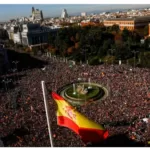London – A startling revelation has emerged, exposing the UK government’s covert practice of monitoring the social media activities of potential critics, resulting in the compilation of “secret files” aimed at preventing them from speaking at public events. The extent of this monitoring spans across fifteen government departments, encompassing areas such as health, culture, media and sport, and environment, food, and rural affairs.
Guidelines within each department instruct officials to scrutinize the Twitter, Facebook, Instagram, and LinkedIn accounts of experts and to perform Google searches using specific terms such as “criticism of government or prime minister.” These protocols, designed to restrict individuals who have criticized the government in the past three to five years from participating in government-organized conferences and events, have come under intense scrutiny.
In September, the Department for Education faced criticism for attempting to cancel invitations for early-childhood education experts to speak at government-funded events based on their perceived criticism of government policies. Subsequently, it has been revealed that this practice extends far beyond education, impacting numerous individuals across various sectors.
Human rights experts at the law firm Leigh Day uncovered the extensive monitoring, shedding light on the scale of this controversial government practice. Tessa Gregory, a partner at Leigh Day, argues that such hidden checks are potentially unlawful, violating data protection laws and raising concerns about potential breaches of equality and human rights legislation.
Dan Kaszeta, a chemical weapons expert, experienced first-hand the consequences of this monitoring when he was disinvited from a UK defense conference due to his social media posts criticizing government ministers and immigration policies. Kaszeta, who has initiated legal action against the government, revealed that he knows of twelve others who discovered evidence of similar blacklisting, with many more potentially unaware of the secret vetting.
While the revelations pose significant embarrassment for the Conservative party, which often champions free speech, the government asserts that the guidelines are under review. The Cabinet Office, responsible for overseeing civil service events, emphasized the necessity for such guidelines to reflect the civil service’s impartiality.
The revelations prompt questions about the balance between safeguarding free speech and ensuring impartiality, leaving critics to contend that vetting experts contradicts the principles of diversity and inclusion. As debates unfold, the UK government faces increased scrutiny over its commitment to protecting free speech.




